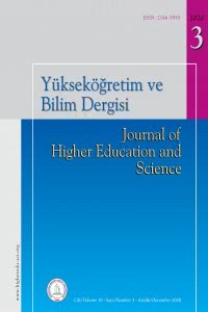Hemşirelik Öğrencilerinin Eğitim Stresi ve Akademik Başarısı: Üç Farklı Eğitim Yönteminin Etkisi
Hemşirelik öğrencileri, Hemşirelik eğitimi, Akademik başarı, Stres
Nursing Students’ Education Stress and Academic Achievement: The Impact of Three Different Education Methods
Nursing students, Nursing education, Academic achievement, Stress,
___
- Aktaş, Y. Y., & Karabulut, N. (2016). A survey on Turkish nursing students’ perception of clinical learning environment and its association with academic motivation and clinical decision making. Nurse Education Today, 36(1), 124–128. doi: 10.1016/j.nedt.2015.08.015
- Atay, S., & Yilmaz, F. (2011). The first stress levels of the students of vocational higher school of health. Journal of Anatolia Nursing and Health Sciences, 14(4), 32-37.
- Cónsul-Giribet, M., & Medina-Moya, J. L. (2014). Strengths and weaknesses of problem based learning from the professional perspective of registered nurses. Revista Latino-Americana de Enfermagem, 22(5), 724-730. doi: 10.1590/0104- 1169.3236.2473
- in UK to analyze the effect of PBL and non-PBL education
- Pulido-Martos, M., Augusto-Landa, J. M., & Lopez-Zafra, E. (2012). Sources of stress in nursing students: a systematic review of quantitative studies. International Nursing Review, 59(1), 15- 25. doi: 10.1111/j.1466-7657.2011.00939.x
- Rhead, M. (1995). Stress among student nurses: is it practical or academic? Journal of Clinical Nursing, 4(6), 369–376.
- Sabanciogullari, S., & Dogan, S. (2012). Ideas concerning school education of the nurses who newly graduated from an integrated school program and their professional identity levels. Florence Nightingale Journal of Nursing, 20(3), 184-192.
- Salamonson, Y., & Andrew, S. (2006). Academic performance in nursing students: influence of part-time employment, age and ethnicity. Journal of Advanced Nursing, 55(3), 342-349. doi:10.1111/j.1365-2648.2006.03863_1.x
- Seren, S., & Ustun, B. (2008). Conflict resolution skills of nursing students in problem-based compared to conventional curricula. Nurse Education Today, 28(4), 393–400. doi:10.1016/j.nedt.2007.07.005
- Seyedfatemi, N., Tafreshi, M., & Hagani, H. (2007). Experienced stressors and coping strategies among Iranian nursing students. BMC Nursing, 13(6). doi: 10.1186/1472-6955-6-11
- Taşdelen, S., & Zaybak A. (2013). The determination the level of stress of nursing students during their first clinical experience. Florence Nightingale Journal of Nursing, 21(2), 101-106.
- Timmins, F., Corroon, A. M., Byrne, G., & Mooney, B. (2011). The challenge of contemporary nurse education programmes. Perceived stressors of nursing students: Mental health andrelated lifestyle issues. Journal of Psychiatric and Mental Health Nursing, 18(9), 758-766. doi: 10.1111/j.1365- 2850.2011.01780.x
- Toraman, A. U., Temel, A. B., Kalkım, A., & Balyacı, Ö. E. (2013). Attitudes and awareness of research among nursing students trained based on classical and integrated education model. DEUHYO ED, 6(3), 132-138.
- Watson, R., Deary, I., Thompson, D., & Li, G. (2008). A study of stress and burnout in nursing students in Hong Kong: a questionnaire survey. International Journal of Nursing Studies, 45(10), 1534–1542. doi: 10.1016/j.ijnurstu.2007.11.003
- Wolf, L., Stidham, A. W., & Ross, R. (2015). Predictors of stress and coping strategies of US accelerated vs. generic baccalaureate nursing students: An embedded mixed methods study. Nurse Education Today, 35(1), 201–205. doi: 10.1016/j. nedt.2014.07.005
- Yalcin, B. M, Karahan, T. F., Karadenizli, D., & Sahin, E. M. (2006). Short-term effects of problem-based learning curriculum on students’ self-directed skills development. Croatian Medical Journal, 47(3), 491-498.
- Yıldırım, N., Karaca, A., Ankaralı, H., Açıkgöz, F., & Akkuş, D. (2016). Stress experienced by Turkish nursing students and related factors. Clinical and Experimental Health Sciences, 6(3), 121- 128. doi: 10.5152/clinexphealthsci.2016.061 766.
- Özbıçakçı, S., Gezer, N., & Bilik, Ö. (2015). Comparison of effects of training programs for final year nursing students in Turkey: Differences in self-efficacy with regard to information literacy. Nurse Education Today, 35(2), e73–e77. doi: 10.1016/j. nedt.2014.10.008
- ISSN: 2146-5959
- Yayın Aralığı: Yılda 3 Sayı
- Başlangıç: 2011
- Yayıncı: Bülent Ecevit Üniversitesi (Önceden Zonguldak Karaelmas Üniversitesi)
İngilizce Öğretiminde Cyberhunt Kullanımının Okuduğunu Anlama Düzeyine Etkisi
Zeynep KUMKALE, Abdullah ADIGÜZEL
Üniversite Öğrencilerinde Narsisistik Eğilimler, Bağlanma Stilleri ve Sosyal Medya Kullanımı
Hatice KAHYAOĞLU SÜT, BURCU KÜÇÜKKAYA, Esra CUMUR, Ecem ÖZDEMİR
Açık ve Uzaktan Öğrenmede Öğrenimi Bırakma Sebeplerinin İncelenmesi
Muhammet Recep OKUR, Didem PAŞAOĞLU BAŞ, Esra pınar UÇA GÜNEŞ
Küreselleşmenin Türkiye’deki Yükseköğretim ve Muhasebe Eğitimi Üzerindeki Etkileri
Rukiye günseli YILDIRIM, Güzin ÖZYILMAZ AKAMCA, Ahmet Murat ELLEZ, Sibel KARABEKMEZ, Ayşe Nur BULUT ÜNER
Hemşirelik Öğrencilerinin Eğitim Stresi ve Akademik Başarısı: Üç Farklı Eğitim Yönteminin Etkisi
Nuray EGELİOĞLU CETİŞLİ, Sezer ER GÜNERİ, Hatice MERT, Elif ÜNSAL AVDAL, Yasemin TOKEM, Hatice YILDIRIM SARI
Eğitim ve Öğretim Teknolojileri Konusunda Yapılan Tezlerin İncelenmesi (2013-2018)
